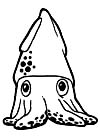(published October 9, 2008)

Hiya, he called quietly to the nearest one.
Hiya youself, said the near one. Have you got any food?
No, he said. What will they do now, the dogs?
They'll wait for us to starve and fall out, the near one said. Or else they'll find a way to come up here. They're not very intelligent, but they may happen to knock over a ladder or trestle with their brute bodies, and then they'll all know what it's for and it'll be no stopping them.
Another of the nearby ones, this one with a runny nose, added, I heard they're all the way to Portland.
As he said this, the new arrival noted that they were, in fact, in an overgrown suburban backyard. A junk-heap of plastic trellises and playground equipment lay abandoned between the trees. Further on, he could make out the shadowy back of a midsized house, now itself abandoned and pulled apart by summer storms. Its porch doors hung open. With nightfall on he could only see inky blackness inside. He shivered. Nights were turning coolish.
We could trick them, suggested the newcomer.
Naw, the near one said. Some of the others tried that. They caught one and skinned it and wore the pelt like they were dogs. For a while it seemed to work, too, but then it's like they were dogs. They fought the others and amongst themselves. That big one, he said, pointing, He's the last of them. He's the leader now.
I heard they're all way to Olympia, the runny-nose one said.
What can we do then? said the new one.
We have a thing that shoots pellets, the near one said. When we have to fight we'll use it against them. Only we don't have many pellets left, so we'll have to be careful and try to hit the leader.
Where's the one with the pellet-shooter? the new one asked.
The near one sent the runny-nose clambering through the branches from tree to tree to fetch him. Then he took a crumpled pack of smokes from his pocket and shook one into his hand, lighting it with a match struck on his coat-zipper. At the sound the mongrels swarmed to the trunk, sniffing, snarling and tearing at each other. You could tell they had once all been separate breeds, but now that they were wild they had gone back to mating willy-nilly. They were losing their ornamental features. Wildness was making them all look the same. The near one dropped the match right into the middle of their swirling mass and was rewarded with a small yelp. This done, he settled back into a crook of the branches like a chair. When he drew on the cigarette, his face appeared, skinny and dirty and sunburned. So you're planning to be leader, he said. That's why we didn't shoot you when you were coming.
What? No, no, said the newcomer.
There was a commotion in the branches, followed by the runny-nose one and a big one with a pellet-shooter. This the leader? asked the big one.
It's a mistake! I'm not a leader! said the new one.
The nearby one said, abashed, I thought he was one. He was asking questions . . .
We need a leader for the battle, explained the runny-nose.
Battle! How can you battle? You said yourself, there's nothing but dogs from here to Toledo and maybe farther! Even if you could get past these ones here, there's packs and packs of them! The new arrival flung his arms wide, indicating the meadow and house, the suburb with its spoiling supermarkets full of buzzing endless light, beyond that the cities with their television stations endlessly playing nonsense, empty static, test signals. How can you battle those? he said. You'll get killed, he said. He couldn't see the others in the copse now, the ones in the other trees, but he knew they were listening closely. He knew he had raised their hopes and now here he was dashing them, but all he could think is that battle would kill them and here, at least, they were safe for the time being. Nobody spoke after this outburst. Even the dogs were quiet. The newcomer shivered on his branch. He couldn't, wouldn't, kill them. He thought: they should try and distract the dogs and get some of those swingsets and trellises and use them to connect the trees together. They could find a way to get to the house and maybe get some food, even if it was mostly spoiled in there, now. Eventually, they could build snares, maybe even a fence the beasts couldn't get in. It would mean a limited life, yes. And the soul yearned for the whole, yes.
Aw, he ain't one, said the big one, finally.
I thought he was, the near one repeated. We oughta shove him from the tree.
No, wait, said the newcomer wearily. Okay, I'll do it. Okay, we'll fight.
Share on Facebook
![]() Tweet about this Piece
Tweet about this Piece
by Siamak Vossoughi
by Mark Konkel
by Kristy Athens
by Kirk Ort
by Thomas Kearnes
by Tantra Bensko
Fiction Archives